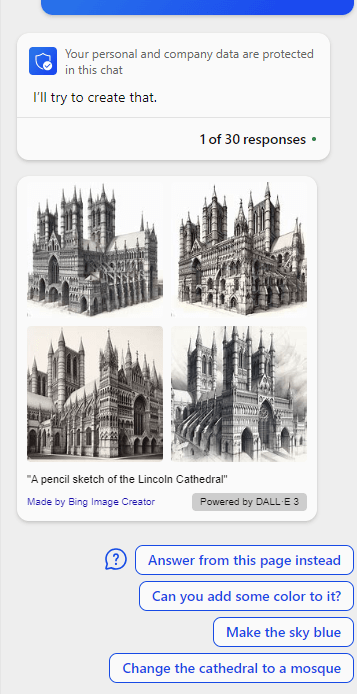Bing Chat for Enterprise
Digital Services are pleased to announce the availability of the first of its Artificial Intelligence services, Bing Chat for Enterprise.
Digital Services have also published an online AI Toolkit to support staff when exploring the benefits of AI, especially in teaching, learning and assessment. This guidance can be used to inform the next steps when using AI.
Bing Chat service will be made available on Monday, 30 October, as an optional new tool. It is available for those wishing to investigate and explore its capabilities. If you have any questions or feedback, please consider posting your ideas and experiences in Viva Engage – Generative AI in higher education (yammer.com).
Bing Chat will be available to all core staff but, due to licence restrictions, will NOT be available to students or associate lecturers.
Background
For anyone familiar with ChatGPT, Bing Chat for Enterprise offers access to the latest AI models through the Bing search page (in any browser) or the Edge browser sidebar (on some recently updated browsers, it may be referred to as Copilot). All of the usual capabilities are there, plus new enhanced ways to utilise the tool for our own organisational benefit, for example, re-writing documents, providing a summary of meeting minutes, or opening a document in the browser and asking Bing-Chat to “Summarise this page.” Bing Chat will also include DALL·E 3, so you will also be able to ask Bing Chat to create images in whatever style you wish.
This is a new technology and only recently released by Microsoft, so it is expected that the service will develop over time and offer more functionality.

Important Notes
Staff must never place organisational data into a large language model (e.g. ChatGPT) that has not been approved for use by the University; this risks your data becoming freely available and used to train the models.
Bing Chat for enterprise prevents this and is approved for use. The data is secure, not shared with anyone else and is not retained or used to train the models. Simply upload the data, and ask your questions. You will be able to copy the output.
How to get access
- To get the best experience, you will need to use the Edge browser. Download Microsoft Edge and the Copilot Sidebar (big blue icon in the top right), and open documents in the browser.

- You will have to log in to the browser with your University credentials.
- Text entries are restricted to 4000 characters or less, depending on how creative you choose it to be.
- It will not keep a record of the query once you have clicked to start a new topic or logged out of the browser, so your query is protected, but if you don’t take a copy, it will be lost.
Please Note: on 30th October, you may have to refresh or restart your browser to enable the service.
The following Microsoft video describes the service:
Next Steps & Support
Over the coming months, Digital Services will be assessing and deploying additional functionalities through both AI and Automation, aiming to take advantage of the opportunities to change how we work and to adopt and embrace these significant technology changes. This initiative is designed to offer the best mix of innovation and efficiency, making best use of existing security processes and licencing models, aligning with the University’s ethical considerations.
For support, please join the discussion at Viva Engage – Generative AI in higher education (yammer.com) or visit the Digital Education online AI Toolkit. For help with using prompts, take a look at the Engineering AI Prompts page.
To find out more, please visit Digital Services – Home (sharepoint.com) For those of you interested in more of the technical details, this Microsoft weblink describes the service, including how it protects our data.